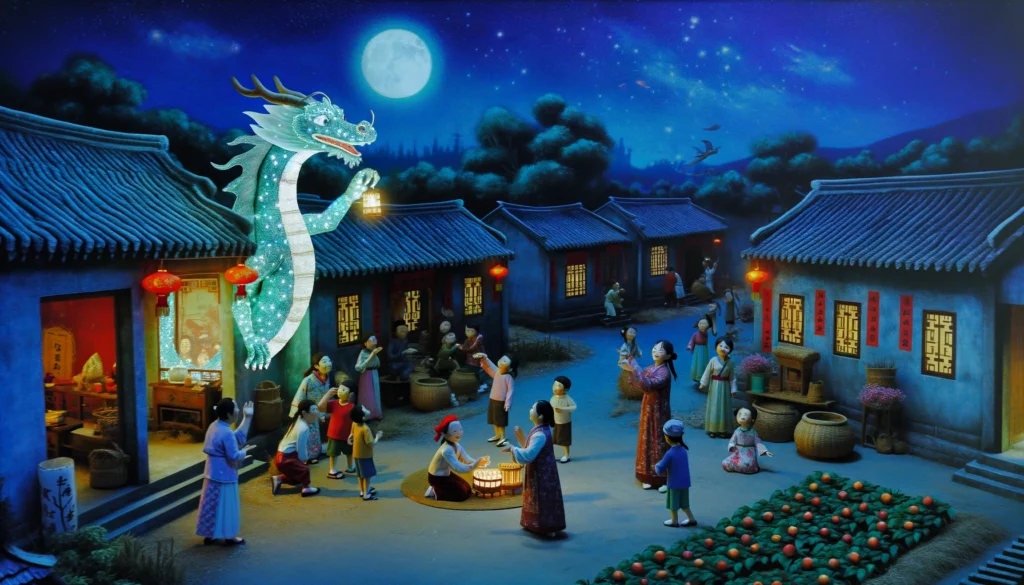This is a free A1 elementary level English reading lesson about the Year of the Dragon. It includes the reading and reading comprehension exercises in 4 different formats together with the answer keys and explanations.

 Share via Google Classroom
Share via Google Classroom

Every twelve years,
a kind dragon comes.
It flies in the sky.
It brings good luck.
People see it and smile.
The dragon makes them happy.
It stays for one day.
Then it flies away.
We wait for it again.
To feel lucky and happy.
General Level: A1.8 (excluding the word ‘dragon’)
Vocabulary: A1.1
Verb Forms: A1.0
Sentences: A1.3
bring VERB A1 x1
Definition (En):
kind NOUN A1 x1
Definition (En):
year NOUN A1 x1
Definition (En):
luck NOUN A2 x1
Definition (En):
lucky ADJ A2 1
Definition (En):
sky NOUN A2 x1
Definition (En):
dragon NOUN C2 x2
Definition (En):
PHRASE | COUNT | SENTENCES |
good luck | 1 |
|
1. What do people do when they see the dragon?
A) They run away.
B) They smile.
C) They sleep.
D) They cry.
2. How long does the dragon stay?
A) One week.
B) One year.
C) One day.
D) One hour.
3. What does the dragon bring?
A) Rain.
B) Friends.
C) Good luck.
D) Music.
4. What happens after the dragon’s visit?
A) The dragon stays forever.
B) People leave the town.
C) It flies away.
D) The sky falls down.
5. Why do people wait for the dragon?
A) To play games.
B) To get gifts.
C) To take pictures.
D) To feel lucky and happy.
6. How does the dragon make people feel?
A) The dragon makes them sad.
B) The dragon makes them read books.
C) The dragon makes them sing songs.
D) The dragon makes them happy.
7. How often does the kind dragon come?
A) Every month.
B) Every twelve years.
C) Every day.
D) Every summer.
Every twelve years,
a kind ___1___ comes.
It ___2___ in the sky.
It brings good ___3___.
People see it and ___4___.
The dragon makes them ___5___.
It stays for ___6___ day.
Then it flies away.
We wait for it again.
To feel lucky and ___7___.
1) A. dragon B. bird C. plane D. star
2) A. flaps B. flies C. walks D. jumps
3) A. chance B. luck C. game D. play
4) A. frown B. cry C. smile D. yell
5) A. sad B. angry C. hungry D. happy
6) A. one B. two C. three D. four
7) A. sad B. angry C. happy D. silent
Explanation: The text says the dragon comes every twelve years, not ten.
(“Every twelve years,”)
Explanation: The text states that the dragon flies in the sky, which means it is not seen on the ground.
(“It flies in the sky.”)
Explanation: The text indicates that seeing the dragon causes people to smile and feel happy.
(“People see it and smile. The dragon makes them happy.”)
Explanation: According to the text, the dragon stays for only one day.
(“It stays for one day.”)
Explanation: The text clearly mentions that the dragon brings good luck, not bad luck.
(“It brings good luck.”)
Explanation: The text suggests that people wait for the dragon to return, which implies a long wait since it comes every twelve years.
(“We wait for it again.”)
Explanation: The text does not say that people feel sad and unlucky when the dragon leaves; it says people wait for it to feel lucky and happy again.
(“To feel lucky and happy.”)
Explanation: The text directly states that people ‘see it and smile’ which indicates they are happy to see the dragon.
(“People see it and smile.”)
Explanation: The text says ‘It stays for one day,’ which tells us the duration of the dragon’s visit.
(“It stays for one day.”)
Explanation: The text mentions ‘It brings good luck,’ indicating that good luck is what the dragon brings.
(“It brings good luck.”)
Explanation: According to the text ‘Then it flies away,’ this happens after the dragon’s visit.
(“Then it flies away.”)
Explanation: The last part of the text ‘To feel lucky and happy’ explains why people wait for the dragon.
(“We wait for it again. To feel lucky and happy.”)
Explanation: The text explicitly states that ‘The dragon makes them happy’ to describe people’s feelings towards the dragon.
(“The dragon makes them happy.”)
Explanation: The first line of the text tells us that the kind dragon comes ‘Every twelve years,’ which is the frequency of its visits.
(“Every twelve years, a kind dragon comes.”)
Explanation: The text states the frequency of the dragon’s visit in the first line.
(“Every twelve years,”)
Explanation: The dragon’s action of bringing good luck is mentioned in the second stanza.
(“It brings good luck.”)
Explanation: The text shows the reaction of the people in the third stanza where it says they smile.
(“People see it and smile.”)
Explanation: The duration of the dragon’s stay is given in the fourth stanza.
(“It stays for one day.”)
Explanation: The action of the dragon flying away after staying for a day is mentioned in the fifth stanza.
(“Then it flies away.”)
Explanation: The text describes the action people take after the dragon leaves in the last stanza.
(“We wait for it again.”)
Explanation: The reason people wait for the dragon is to feel emotions, which is stated in the last line of the text.
(“To feel lucky and happy.”)
Explanation: The correct answer is ‘dragon’. The text speaks of a kind dragon.
Explanation: The correct answer is ‘flies’. ‘It flies in the sky’ matches the rest of the text.
Explanation: The correct answer is ‘luck’. The dragon is said to bring good luck.
Explanation: The correct answer is ‘smile’. ‘People see it and smile’ is from the original text.
Explanation: The correct answer is ‘happy’. The dragon is said to make them happy.
Explanation: The correct answer is ‘one’. The text says ‘It stays for one day’.
Explanation: The correct answer is ‘happy’. The text wants people to feel lucky and happy again.
On Cathoven, you can create readings and exercises tailored to specific vocabulary, grammar points, and proficiency levels, all within minutes.

© 2025 Cathoven AI | All rights reserved